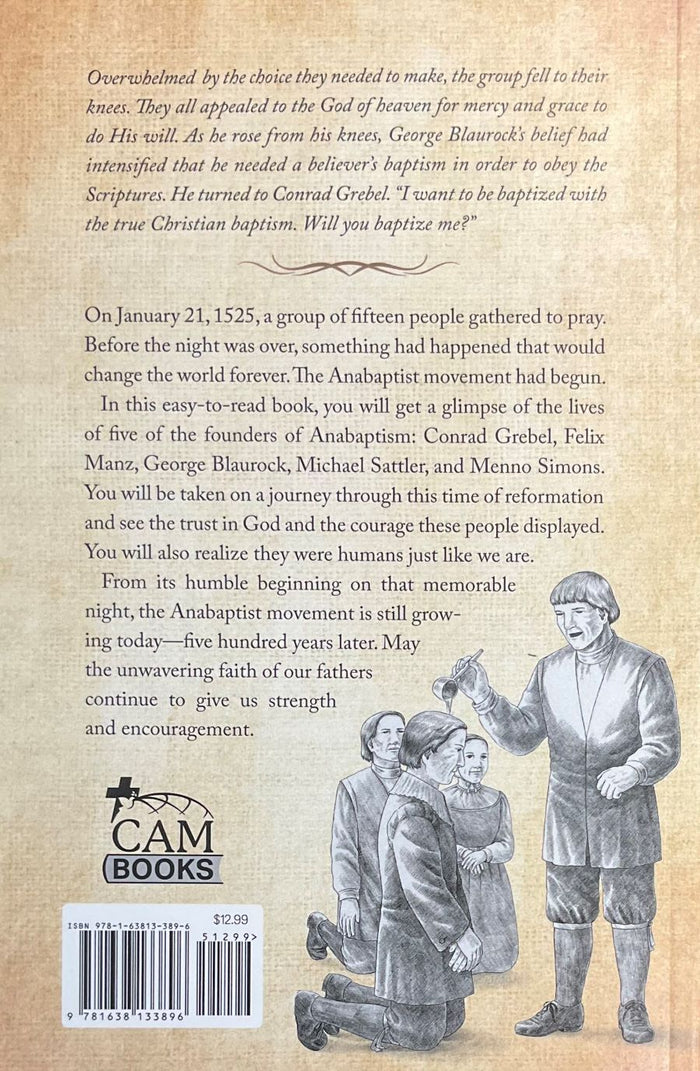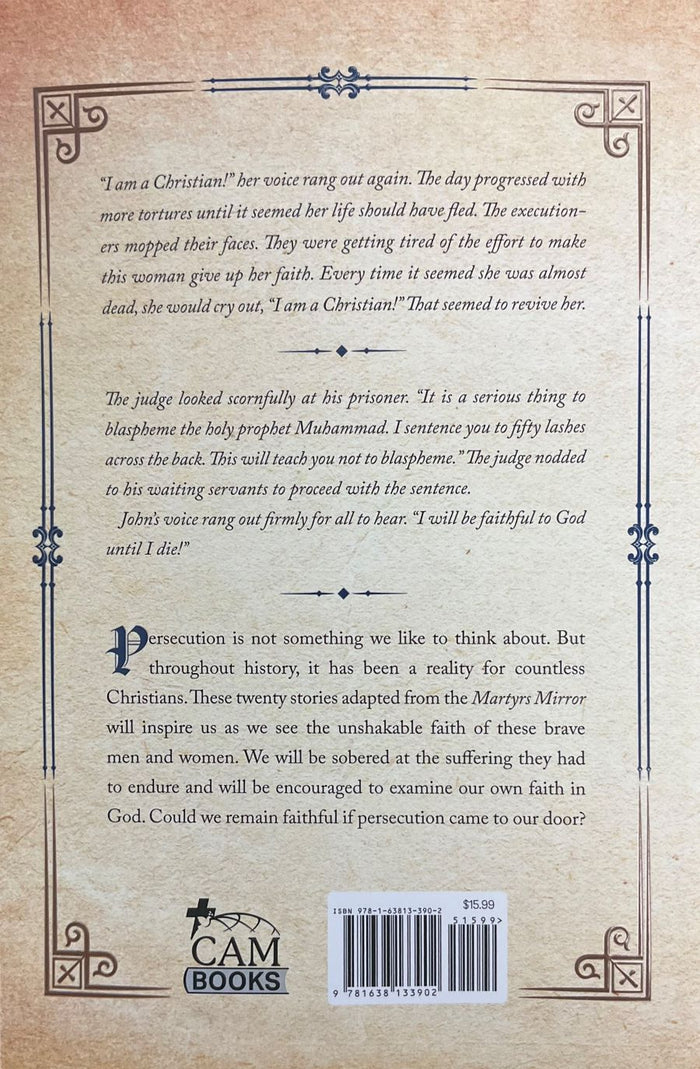
500 years ago on January 21, 1525, a woman opened her door and welcomed a group of young men into her home. Her actions and presence would quietly influence these young men. Her kindness blessed them all. But she naturally loved one of their leaders more than all the others. He was after all her oldest son. Yet as much as she loved him, she loved her Savior even more. And so, she gave her son the greatest gift of love a mother can: unreserved faith in God. The faith that she instilled in her son would live beyond her comprehension. It would echo and re-echo down through the centuries. Today, 500 years later, its effects can still be felt across the entire globe.
We do not know this woman’s name. We can only roughly guess her age. We do know that she wasn’t perfect. In fact, for many years she lived in direct contradiction to the Word of God. When she was young, she faced a problem with no good solution. She loved a man she could not marry. Because of his position in the Catholic church, marriage was forbidden. Yet he loved her. And she loved him. So in spite of better knowledge both gave in to a life of sin. She would give birth to two sons, possibly more. But again, history is silent. At some point, she repented. When, we do not know. And, somehow, she instilled in her sons a love for Truth.
Her oldest son, Felix Manz, would become fiercely dedicated to God’s Word. He would receive a good education, becoming very knowledgeable in Hebrew, Greek, and Latin. Born in 1498, he was still in his early twenties when he encountered a well-known priest named Ulrich Zwingli. Zwingli’s open denouncement of various Catholic practices and his dedication to sola scriptura (Scripture alone) intrigued him. He became close friends with several of Zwingli’s followers, including two others who were also in their early to mid-twenties named Conrad Grebel and George Blaurock. They would meet often in the home of Felix Manz’s mother for Bible study. All were filled with fire and zeal for Truth of the Gospel.
Then the trouble began. Zwingli would only carry his convictions so far. He refused to initiate change unless the civil authorities gave their blessing. Political intrigue ensnared him. And so, he compromised whenever the Zurich council (the highest political authority in that area of Switzerland) required it. But several of his young disciples including Felix Manz, Conrad Grebel, and George Blaurock would not compromise.
While there were several disagreements, the hottest topic was the subject of infant baptism vs. believer’s baptism. While Zwingli initially agreed with his young followers that baptism was only for those old enough to believe in Christ and confess their sins, he changed his mind when the Zurich council ruled that infant baptism was mandatory for every citizen. There would be no freedom of religion. While the churches in Zurich would no longer be Catholic, they would still be firmly under the thumb of the state. All infants would be baptized by law, ensuring that all citizens would also be under the control of the state church. Any dissension or disobedience to this ruling was to be met with harsh consequences. Zwingli not only changed his position on this matter, but defended the council’s decision and stood by to help enforce it. The allure of political power was too strong for him to resist.
So the gathering in the home of Felix Manz’s mother on January 21, 1525 was a troubled one. Most of these young men were in their mid-twenties. Any ladies present were likely close to the same age. Yet these young people found themselves outside of the law. It was time to choose. Follow their Biblical convictions and face imprisonment and possibly even death? Or compromise and give up the faith they had come to cherish.
What was the host of that evening thinking as she watched her son and his friends debating? She was older now. A single mother. Did she rely on her sons for financial support? If her son chose the same path of suffering that the Savior walked, what was her future? Would her son become a hunted criminal? Could he ever marry? Would she never enjoy the thrill of holding a grandchild in her arms? Would the simple joys of a mother and grandmother be denied her?
So she prayed. When it was suggested that the group kneel together and lay their problem before the Lord, she knelt with the others. Yet surely her prayer that night was unique from the others. In many ways, she had more to lose. Only another mother could understand the anguish in her heart as she watched the man that she had birthed, loved, and raised, grapple with the incredible choice that lay before him. No matter how hard the path he chose, it would be harder for her.
With the prayer ended and their hearts moved with conviction, the group chose to receive Believers’ baptism at that very moment. Though they had all been baptized as babies, that night they rebaptized themselves as believers who could confess their faith in Jesus Christ. Their course was set. They would willingly pay the consequences.
For the mother who stayed quietly in the background, all her fears would come true. The faith that was kindled that night would spread like wildfire across Switzerland. Just as quickly oppression followed in the form of imprisonment, beatings, banishment, and other types of intimidation. Zwingli and the Zurich council would go to great lengths to extinguish this new radical pursuit of Truth.
They called Felix Manz and his friends, Anabaptists, meaning re-baptizers, referencing their belief that infant baptism was not enough and that all Christians should be baptized as believers. However, since the name Anabaptist at that time had a very negative connotation, the group simply called themselves “the Brethren”.
Other similar groups had sprung up and consequently collapsed throughout Europe during the Reformation. But this group, the Brethren, was very different. They refused to carry weapons. They never fought back against their persecutors. Instead, they defended themselves with the Word of God, encouraged their oppressors to come share the faith they loved. And then they quietly suffered whatever abuse they received.
Finally, the Zurich council decided to put an end to this peaceable movement by silencing its leaders forever. So, on January 5, 1527, just short of two years from the start of the movement, Felix Manz was sentenced to die by drowning. He was only 28 years old.*
How did this unjust sentence affect his mother? The son she loved would so soon be cruelly ripped from her life. She could have pleaded with him to give up his new faith. She could have railed at the cruelty, the miscarriage of justice. She could have vowed vengeance or perhaps called on God to strike down the hypocritical men that were taking her son from her. But she did not. Instead, she was silent. Silent until the very last moment.
As Felix Manz was led to the river to be executed, he was fearless. He told those he passed that he was about to die for the truth. He also praised God. And finally, when he was about to die, his mother spoke. She and his younger brother called to him from the opposite shore of the Limmat River where the execution was to take place. So many things she could have said. So many things she wanted to say. But time was short. So she called out the most important message she could. The one that burned the brightest in her heart. What her exact words were, we do not know. But she encouraged him to stand strong. To be true to his faith. To not give up. Not now. Not when his eternal reward was so close. Her son replied by calling out in Latin “Into thy hands, O God, I commend my spirit”. And then it was over. And her son was gone from this world.
The simple message she called to her son in his last moments reveals so much about this woman of faith. Certainly, she loved her son with all her heart. She would have gladly taken his place if she could. Yet she loved her Savior more than her son’s life. And so loved her son with a spiritual love far above the natural love that tore her heart as he died. For in her quiet motherly way she showed him the path to Salvation. Somehow, at a young age, she helped him glimpse a world far better than this one. She had raised a son who proved that Christ’s kingdom was here and now. That it was a kingdom of love and peace. That no one was forced to come but all were welcome. That the citizens of this kingdom would rather suffer as their Savior did, than cause the suffering of another.
In the last few days of his life Felix Manz wrote a letter to his fellow Brethren.** In it he said “Only love to God through Christ shall stand and prevail; not boasting, denouncing, or threatening. It is love alone that is pleasing to God: he that cannot show love shall not stand in the sight of God.” Further on he wrote “Christ also never hated any one; neither did His true servants, but they continued to follow Christ in the true way, as He went before them.” He then closed his letter: “And thus I close with this that I will firmly adhere to Christ, and trust in Him, who is acquainted with all my needs, and can deliver me… Amen.”
Felix Manz’s mother could not see into the future; but by faith she believed that God was in control and that His will would be done. The Brethren would continue to grow and spread across Switzerland in spite of intermittent persecution and constant intimidation and oppression. Approximately 30 years later they would join with a like-minded group of Dutch brethren from Holland, one of whom was a well-known preacher named Menno Simons. And so, the name Mennonite was born. Many Anabaptist groups besides the Mennonites including the Amish, Hutterites, and others would trace their roots and/or doctrine back to that small group of young men that met in the home of Felix Manz’s mother.
Eventually many would heed the welcoming call of a Quaker named William Penn and would emigrate to Pennsylvania where all were welcome to worship as they chose. Some of the Brethren would flee to Russia, and then to North and South America. By the present day it can be said that the spiritual descendants of the Brethren have survived and even thrived on almost every continent and under every form of government from communism to democracy, whether persecuted or tolerated.
Most currently reside in North and South America, but there are multiple churches and missions all around the world from Europe to Africa to Asia. While there are some differences between the various groups descending from the Brethren, all rally around the doctrine of Believer’s baptism. To this day, most believe in a plain and simple lifestyle to some degree or another. While they are not perfect, it is always their desire to show love and kindness to all. To never take up a weapon and harm another human being but to rather suffer meekly and with humility. While often expressing the desire to live quietly and peaceably, they are usually active in missions and service of some kind. Volunteering after natural disasters, inner city missions, smuggling Bibles into Communist and Islamic countries, rebuilding war-damaged homes in Ukraine, just to name a few.
No, Felix Manz’s mother could not see the future. Yet she believed. And her faith was rewarded. God still calls people to a life of faith today. Ever since His Son walked the earth, God has called the most unsuspecting people from the most unusual places. God still wants people who can stand for their faith even in the face of the most violent opposition. He calls all, even the unlikeliest of people. Even you. Wherever God’s people are, whoever they might be, God has a plan for each one.
And as the mother of Felix Manz proved, a quiet life of faith can affect the entire world.
*The age of Felix Manz at death could not be completely verified but it is highly likely that he was 28 years old.
**The entire letter can be found in The Martyrs Mirror p.415
Sources:
Global Anabaptist Mennonite Encyclopedia Online
Faith of Our Fathers: The birth of Anabaptism by Romaine Stauffer





0 comments